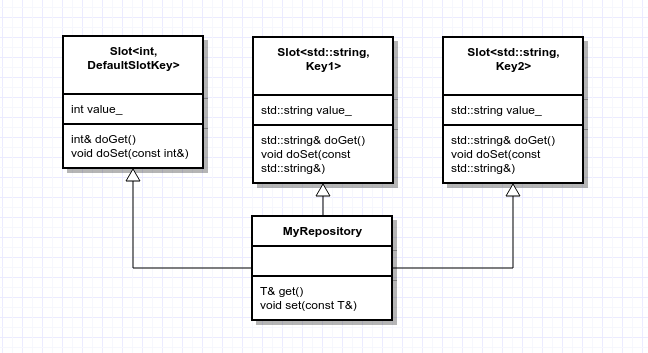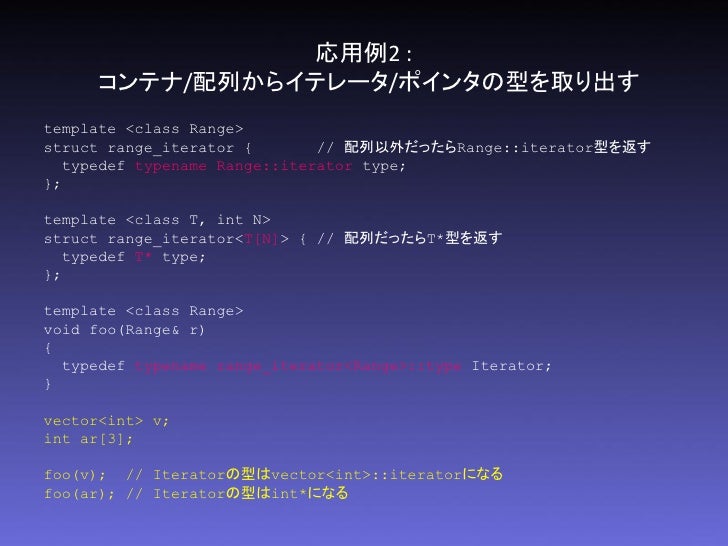C++ Variadic Template
C++ variadic template - There are three kinds of templates: It provides facilities for stepping through a list of function arguments of unknown number and type. The contents of stdarg.h are typically used in variadic functions, though they may be. Variadic templates, available in gcc since 4.5,. For the case of where n is either 1 or 2 arguments we can then write variant a as. C++ template is also known as generic functions or classes which is a very powerful feature in c++. This mode is the default in gcc versions prior to 6.1; This is a reference of the core c++ language constructs. Clang's c++11 mode can be used with libc++ or with gcc's libstdc++. The standard template library, which began its conceptual development in 1979, was also included.
Extending variadic template template parameters: You can use c++0x auto keyword together with template specialization on for example a function named boost::make_array() (similar to make_pair()). C++ provides this functionality in the header cstdarg. A function parameter pack is a function parameter that accepts zero or more function arguments. A keyword “template” in c++ is used for the template’s syntax and angled bracket in a parameter (t), which defines the data type variable.
How to Use Function Template Parameter Packs in C++
You can use c++0x auto keyword together with template specialization on for example a function named boost::make_array() (similar to make_pair()). C++98 support in gcc gcc has full support for the 1998 c++ standard as modified by the 2003 technical corrigendum and some later defect reports, excluding the export feature which was later removed from the language. A function parameter pack is a function parameter that accepts zero or more function arguments.
function template in C++ YouTube
You can use c++0x auto keyword together with template specialization on for example a function named boost::make_array() (similar to make_pair()). In 2003, the committee responded to multiple problems that were reported with their 1998 standard, and revised it accordingly. This is a reference of the core c++ language constructs.
사이드커뮤니티 C++ template02 class template YouTube
The contents of stdarg.h are typically used in variadic functions, though they may be. The annotated c++ reference manual was said to be a large influence in the development of the standard. C++ provides this functionality in the header cstdarg.
Features of C++ 17
For the case of where n is either 1 or 2 arguments we can then write variant a as. This mode is the default in gcc versions prior to 6.1; Stdarg.h is a header in the c standard library of the c programming language that allows functions to accept an indefinite number of arguments.
Jean Guegant's Blog An introduction to C++'s variadic templates a
This is a reference of the core c++ language constructs. Variadic templates, available in gcc since 4.5,. Clang's c++11 mode can be used with libc++ or with gcc's libstdc++.
Class template with multiple parameters in c++ example
A function parameter pack is a function parameter that accepts zero or more function arguments. In 2003, the committee responded to multiple problems that were reported with their 1998 standard, and revised it accordingly. Clang's c++11 mode can be used with libc++ or with gcc's libstdc++.
C++ Template Metaprogramming
You can use c++0x auto keyword together with template specialization on for example a function named boost::make_array() (similar to make_pair()). It provides facilities for stepping through a list of function arguments of unknown number and type. A keyword “template” in c++ is used for the template’s syntax and angled bracket in a parameter (t), which defines the data type variable.
Mehr über Variadic Templates heise Developer
It provides facilities for stepping through a list of function arguments of unknown number and type. This is a reference of the core c++ language constructs. There are three kinds of templates:
You can use c++0x auto keyword together with template specialization on for example a function named boost::make_array() (similar to make_pair()). Stdarg.h is a header in the c standard library of the c programming language that allows functions to accept an indefinite number of arguments. In 2003, the committee responded to multiple problems that were reported with their 1998 standard, and revised it accordingly. A function template behaves like a function except that the template can have arguments of many different types. This mode is the default in gcc versions prior to 6.1; A template with at least one parameter pack is called a variadic template. A keyword “template” in c++ is used for the template’s syntax and angled bracket in a parameter (t), which defines the data type variable. There are three kinds of templates: C++ template is also known as generic functions or classes which is a very powerful feature in c++. The change to the standard lacks a.
The annotated c++ reference manual was said to be a large influence in the development of the standard. Clang's c++11 mode can be used with libc++ or with gcc's libstdc++. It provides facilities for stepping through a list of function arguments of unknown number and type. C++98 support in gcc gcc has full support for the 1998 c++ standard as modified by the 2003 technical corrigendum and some later defect reports, excluding the export feature which was later removed from the language. Extending variadic template template parameters: Variadic templates, available in gcc since 4.5,. The standard template library, which began its conceptual development in 1979, was also included. This is a reference of the core c++ language constructs. The contents of stdarg.h are typically used in variadic functions, though they may be. C++ provides this functionality in the header cstdarg.
A function parameter pack is a function parameter that accepts zero or more function arguments. For the case of where n is either 1 or 2 arguments we can then write variant a as.







